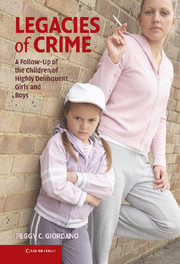Book contents
- Frontmatter
- Contents
- Acknowledgments
- 1 Introduction
- 2 Literature Review and Conceptual Framework
- 3 The Ohio Life-Course Study
- 4 OLS Adult Respondents: Offending, Surviving, Parenting
- 5 How Have the OLS Children Fared?
- 6 The Intergenerational Transmission Process
- 7 “Success Stories”: It's All Relative
- 8 Theoretical and Policy Implications of the OLS Study
- References
- Index
8 - Theoretical and Policy Implications of the OLS Study
Published online by Cambridge University Press: 05 June 2012
- Frontmatter
- Contents
- Acknowledgments
- 1 Introduction
- 2 Literature Review and Conceptual Framework
- 3 The Ohio Life-Course Study
- 4 OLS Adult Respondents: Offending, Surviving, Parenting
- 5 How Have the OLS Children Fared?
- 6 The Intergenerational Transmission Process
- 7 “Success Stories”: It's All Relative
- 8 Theoretical and Policy Implications of the OLS Study
- References
- Index
Summary
This longitudinal study presented a unique opportunity to follow up the children of young people who as adolescents had engaged in serious, sometimes repeated, acts of law violation. After these respondents were released from the juvenile institution in which they had initially been interviewed in 1982, many of them continued a pattern of crime and drug abuse well into their adult years. When we interviewed them in 1995, in addition to self-reported crime and adult arrests, the women and men who participated in the OLS frequently also reported numerous other disadvantages and life problems, including depression, a lack of employment, housing instability, and continued association with antisocial family members, friends, and romantic partners. And while male self-reported crime scores were higher and prison stays for males on average longer, we did not find that women in the sample quit crime abruptly with the birth of their first child, an outcome that some prior research has indicated. The women were, however, more likely than their male counterparts to either live with their children or have contact with them, which is consistent with women's central childrearing role in our society. At the same time, the OLS women were significantly more likely than is typical for women in the general population (according to U.S. census figures) to indicate that at least one and sometimes all of their children were not currently living with them or had not lived with them at some earlier point.
Information
- Type
- Chapter
- Information
- Legacies of CrimeA Follow-Up of the Children of Highly Delinquent Girls and Boys, pp. 205 - 230Publisher: Cambridge University PressPrint publication year: 2010
